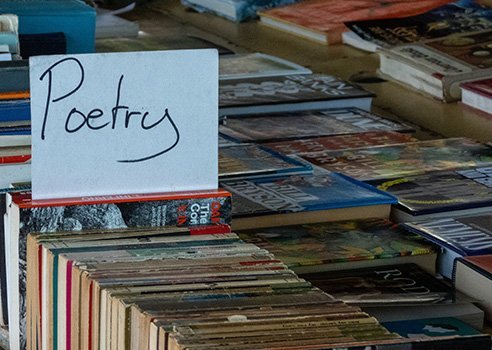Word count: 691 words
Reading time: Less than 3 minutes
I know this will make me sound horribly old-fashioned, but I’ve been convinced that all writers — even non-fiction ones — should read poetry. Here’s why….
My relationship with poetry has been troubled. It didn’t start well. When I was a child, my father — a diehard Brit, whose favourite breakfast was smoked kippers — encouraged me to read Rudyard Kipling. (Boots, boots, boots, boots, marching up and down again and there’s no discharge in the war.) I was seven. Not only had I never encountered war, I don’t think I’d ever met a soldier. The pulsing rhythm of the verse commandeered my attention but the meaning skidded right over my head.
In high school I suffered through the usual predictable poetry – William Blake, Elizabeth Barrett Browning and, memorably, Samuel Taylor Coleridge. I say “memorably” mainly because my grade 12 lit teacher inserted him into the curriculum when she discovered — to her horror — that no one in the class had ever studied the Rime of the Ancient Mariner. (We don’t mind, we cried, helplessly.)
In university, I finally had a brief poetic epiphany thanks to a gifted English professor. Betty Belshaw taught her students to read poems as if we were detectives attacking particularly interesting cold cases. Incredibly, at least to an 18-year-old from Catholic school, our discussion of The Lovesong of J. Alfred Prufrock included a debate on diarrhea. (This related to the line, “Do I dare to eat a peach?”) I don’t recall talking about s/ex, but, surely, we must have. Suddenly, poetry was interesting!
From there, I went to become a fan of Dylan Thomas, William Carlos Williams and Gwendolyn MacEwen and even wrote some poetry of my own. By the time I was 25, however, my interest had trickled away.
Then, a few weeks ago, a friend asked me if I’d ever read Joseph Brodsky’s essay on the value of poetry. “I read it in 1998,” she said, “but I’ve been reading poetry ever since, so it made quite an impression.”
I vaguely knew that Brodsky was a Russian emigree poet (1940-1996) but didn’t know he’d won the Nobel prize for Literature in 1987 and was US poet laureate in 1991. Of course I’d never read any of his work before. Quickly, I placed a library hold on a book of his essays, On Grief and Reason. The essay on poetry, “How to Read a Book,” stunned me.
It is sublime.
Here, to me, is the most convincing part of his argument:
“The way to develop good taste in literature is to read poetry,” he wrote. “[It] is not only the most concise, the most condensed way of conveying the human experience; it also offers the highest possible standards for any linguistic operation — especially one on paper.
“The more one reads poetry, the less tolerant one becomes of any sort of verbosity, be that in political or philosophical discourse, be that in history, social studies or the art of fiction. Good style in prose is always hostage to the precision, speed and laconic intensity of poetic diction. A child of epitaph and epigram, conceived indeed as a shortcut to any conceivable subject matter, poetry to prose is a great disciplinarian.
“It teaches the latter not only the value of each word but also the mercurial mental patterns of the species, alternatives to linear composition, the knack of omitting the self-evident, emphasis on detail, the technique of anticlimax.”
Brodsky also provides a list of recommendations, tailored to the readers’ mother tongue. For English speakers he suggests: Robert Frost, Thomas Hardy, W. B. Yeats, T. S. Eliot, W. H. Auden, Marianne Moore and Elizabeth Bishop.
So, 30 years after my last interest in poetry, I am starting to read it again. I’m beginning with the poems in the New Yorker and I think, over my holidays, I will bring a book or two of poetry along to the beach with me.
I’m also bringing Brodsky’s book of essays. That man can write!
Here is an online link to his essay, How to Read a Book. Please don’t read it online. Instead, print it out. It’s worth your unfettered attention.


